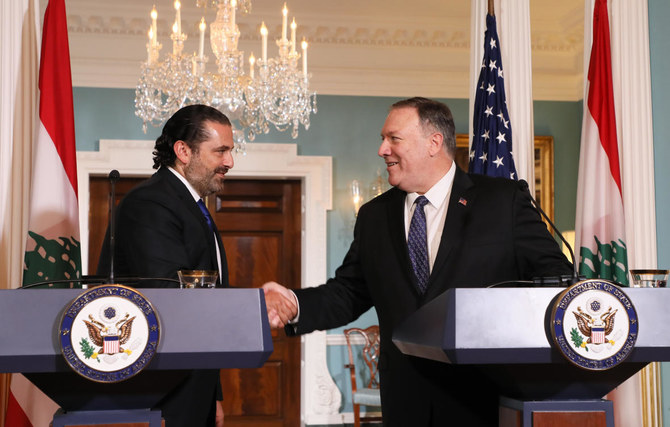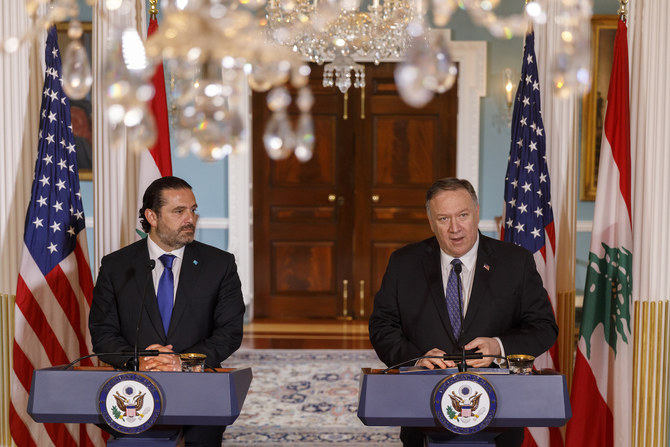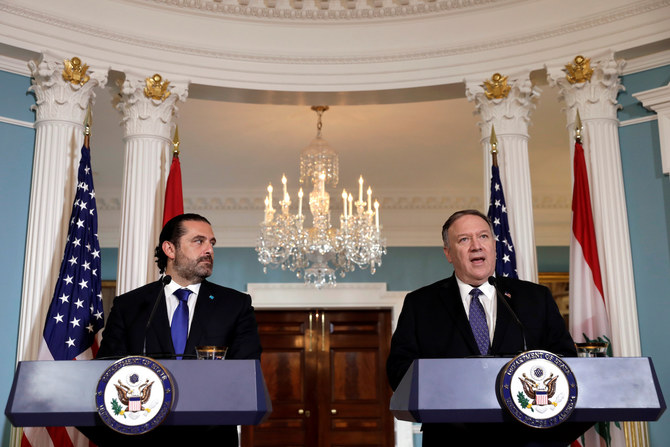BEIRUT: US Secretary of State Mike Pompeo on Thursday praised the commitment of the Lebanese government to protecting its country in the face of the threat posed by Iran and Hezbollah.
It came during his meeting in Washington with Lebanese Prime Minister Saad Hariri. David Schenker, the assistant secretary of near eastern affairs, and David Hill, undersecretary of state for political affairs, were also present.
Pompeo also reassured Hariri of “the commitment of the United States to support Lebanon and its institutions, to preserve its security and stability, and to procure the needs of the Lebanese people.”
He also praised “Lebanon’s commitment to providing support to more than one million Syrian refugees residing on its soil, who have fled the injustice of the Assad regime.”
“We call for continuing the discussions related to the remaining points related to the Blue Line (the UN’s border demarcation between Lebanon and Israel) and the Lebanese maritime borders (with Israel). We are ready to mediate the maritime dispute between Lebanon and Israel and hope to reach concrete results,” Pompeo added.
After the meeting, Hariri said he hoped to “reach a conclusive decision in the upcoming months regarding the border demarcation negotiations.” He thanked the US for its “continuous support for the Lebanese Army,” and restated Lebanon’s commitment to fighting terrorism.
He also noted Lebanon’s “continuous support for the Cedar Conference (of international investors) and its investment plan, which is highly necessary to the Lebanese economy.” During a Cedar conference in Paris in April 2018, Lebanon secured pledges of $10.2 billion in loans and $860 million in grants, which are dependent on economic reforms.
Earlier, Hariri spent more than an hour with David Malpas, president of the World Bank, during which he assured the financier: “Lebanon’s relationship with the World Bank is very important and we continue to cooperate in various sectors, especially electricity, telecommunications and waste management.”
The prime minister said that he also explained to Malbas “the challenges that we face in Lebanon on the economic and political levels.”
Regarding the IMF’s reluctance to cooperate with Lebanon, Hariri said: “The IMF focuses mainly on the financial situation, while the World Bank is our partner and we are executing many projects with them.”
Asked whether or not his meetings in Washington made him optimistic that Lebanon’s credit rating will improve, Hariri said: “I know that Lebanon’s financial figures are critical and we have a great challenge with (credit rating agency) Standard & Poor’s, and we are working on improving our rating. However, this does not mean that our situation is not good; on the contrary, we are taking all necessary steps that would lead us to safety. The most important thing is not to respond to bad news by not performing our duties, and to reach safety.”
Lebanese authorities are awaiting the latest Standard & Poor’s report, which is due to be released on Aug. 23. They fear the nation’s credit rating will be downgraded to CCC, which would have negative repercussions on its economy, the banking sector and on the value of the Lebanese pound, especially given the strained political situation in the country at a time when it needs to begin implementing reforms required by Cedar investors.
Hariri was concluding a visit to Washington that comes less than a week after the Lebanese government reconvened following 40 days of inactivity in the wake of an incident in Mount Lebanon on June 30, during which two bodyguards working for Minister for Refugee Affairs Saleh Al-Gharib were shot and killed. This led to a political standoff between Druze leaders Walid Jumblatt, head of the Progressive Socialist Party, and Talal Arslan, leader of the Democratic Party and an ally of Al-Gharib, who each blamed the other’s supporters for the violence. A reconciliation agreement was reached on Aug. 9.
During his visit, Hariri also met Undersecretary of Defense John Rudd. They discussed “ways to support the Lebanese army and the security forces,” according to the prime minister’s office. He also met with Treasury officials, including Marshall Billingslea, the Treasury Department’s assistant secretary for terrorist financing, in light of the announcement by the US of fresh sanctions on Hezbollah officials. On July 9, the Treasury Department’s Office of Foreign Assets Control imposed sanctions on Hezbollah MPs Amin Sherri and Mohammad Raad, and on Wafiq Safa, Hezbollah’s security chief.
The US accuses Hezbollah of “using its members in the Lebanese Parliament to manipulate institutions to support the financial and security interests of the terrorist group and to promote malicious activities of Iran.” It also accuses Hezbollah of “threatening economic stability and security in Lebanon and the region as a whole, at the expense of the Lebanese people.”
Pompeo praises Lebanese government for standing firm against Iranian threat
Pompeo praises Lebanese government for standing firm against Iranian threat

- Pompeo assures PM Saad Hariri Washington is committed to supporting Lebanon and preserving security
- Hariri thanks US for “continuous support,” pledges to continue battling terrorism and working on economic reform
Israel PM calls security chief ‘liar’, in court filing

- Bar’s dismissal, announced by the government last month but frozen by the country’s top court, triggered mass protests.
JERUSALEM: Israeli Prime Minister Benjamin Netanyahu, in an affidavit before the Supreme Court on Sunday, described as a “liar” the country’s internal security chief, whom the government is trying to fire.
Netanyahu’s response came almost a week after Shin Bet head Ronen Bar himself made a sworn statement to the court. It accused the prime minister of demanding personal loyalty and ordering him to spy on anti-government protesters.
Bar’s dismissal, announced by the government last month but frozen by the country’s top court, triggered mass protests.
The unprecedented move to fire the head of the Shin Bet security agency has been contested by the attorney general and the opposition, which appealed Bar’s firing to the Supreme Court.
“The accusation according to which I allegedly demanded action against innocent civilians, or against a non-violent and legitimate protest during the protests of 2023, is an absolute lie,” Netanyahu said in his court statement.
In his own affidavit, Bar had said “it was clear” that in the event of a potential constitutional crisis, Netanyahu would expect Bar to obey the prime minister and not the courts.
Netanyahu countered: “There is no proof supporting these remarks.”
Bar had also denied accusations by Netanyahu and his associates that the Shin Bet had failed to warn in time about Hamas’s unprecedented October 7, 2023, attack on Israel that triggered the war in Gaza.
“Nothing was hidden” on that night from the security apparatus or the prime minister, Bar said.
Netanyahu countered before the court that Bar “did not accomplish his mission” that night.
“He did not wake up the prime minister. He did not wake up the minister of defense. He did not wake up the soldiers of the army,” or others before the attack, Netanyahu alleged.
The prime minister’s 23-page document said Bar “failed in his role as chief of Shin Bet and lost the confidence of the entire Israeli government as far as his ability to continue to manage the organization.”
Netanyahu’s office had already made similar public comments immediately after Bar filed his affidavit.
An April 8 Supreme Court hearing on the government’s plans to fire Bar ruled that he “will continue to perform his duties until a later decision.”
Syria rejects Kurds’ call for decentralization

- The new authorities in Syria, who replaced the overthrown Bashar Assad in December, have repeatedly rejected the idea of Kurdish autonomy
- Most of Syria’s oil and gas fields are in areas administered by the Kurdish authorities
DAMASCUS: The Syrian presidency rejected on Sunday a Kurdish call for a decentralized state, warning against attempts at separatism or federalism by the minority group.
“We reject clearly any attempt to impose a separatist reality or to create separate entities under the cover of federalism... without a national consensus,” the presidency said in a statement in which it also condemned “the recent activities and declarations” of the Kurdish-led Syrian Democratic Forces (SDF) that “call for federalism.”
“The unity of Syria, of its territories and its people is a red line,” the statement said.
The declaration came a day after a conference of Syrian Kurdish parties adopted a joint vision of a “decentralized democratic state.”
The new authorities in Syria, who replaced the overthrown Bashar Assad in December, have repeatedly rejected the idea of Kurdish autonomy.
The US-backed Kurds control large areas of northeastern Syria, much of which they took over in the process of defeating jihadists of the Daesh group between 2015 and 2019.
They have enjoyed de facto autonomy since early in the civil war which broke out in 2011, but the new authorities have insisted on a unitary state.
In March, Syria’s interim president, Ahmed Al-Sharaa, and the SDF chief Mazloum Abdi, signed an agreement to integrate Kurdish institutions into the Syrian state.
Abdi told the conference on Saturday that “my message to all Syrian constituents and the Damascus government is that the conference does not aim, as some say, at division.”
Instead it aimed “for the unity of Syria,” he insisted.
“We support all Syrian components receiving their rights in the constitution to be able to build a decentralized democratic Syria that embraces everyone,” Abdi said.
Most of Syria’s oil and gas fields are in areas administered by the Kurdish authorities. These may prove a crucial resource for Syria’s new authorities as they seek to rebuild the war-devastated country.
Death toll from Iran port blast hits 40 as fire blazes

- The explosion ripped through the port as Iranian and US delegations were meeting in Oman for high-level talks on Tehran’s nuclear program
- While Iranian authorities appear to be treating the blast as an accident, it also comes against the backdrop of years of shadow war with Israel
TEHRAN: Iran’s president visited the scene of a massive port blast that killed at least 40 people and injured more than 1,000, as a fire still blazed on Sunday more than 24 hours after the explosion.
The blast occurred on Saturday at Shahid Rajaee Port in southern Iran, near the Strait of Hormuz, through which a fifth of world oil output passes.
With choking smoke and air pollution spreading throughout the area, all schools and offices in Bandar Abbas, the nearby capital of Hormozgan province, were ordered closed to allow authorities to focus on the emergency effort, state television said.
The health ministry urged residents to avoid going outside “until further notice” and to use protective masks.
Arriving in Bandar Abbas, President Masoud Pezeshkian expressed his appreciation to first responders, adding “we have come to see first-hand if there is anything or any issue that the government can follow up on.”
“We will try to take care of the families who lost their loved ones, and we will definitely take care of the dear people who got injured,” he said.
A photo released by Pezeshkian’s office later showed him at the bedside of a man hurt in the blast.
Pezeshkian earlier ordered an investigation into the cause of the explosion.
The Russian embassy said Moscow was sending multiple “aircraft carrying specialists” to help fight the blaze. According to Russia’s ministry of emergency situations, one of the aircraft is a dedicated firefighting plane.
The New York Times quoted a person with ties to Iran’s Islamic Revolutionary Guard Corps, speaking on condition of anonymity to discuss security matters, as saying that what exploded was sodium perchlorate — a major ingredient in solid fuel for missiles.
Defense ministry spokesman Reza Talaei-Nik later told state TV that “there has been no imported or exported cargo for military fuel or military use in the area.”
The port’s customs office said in a statement carried by state television that the explosion probably resulted from a fire that broke out at the hazardous and chemical materials storage depot.
A regional emergency official said several containers had exploded.
“For the moment, 40 people have lost their lives as a result of injuries caused by the explosion,” Hormozgan provincial official Mohammad Ashouri told state television.
The ISNA news agency, citing the provincial judiciary, gave the number of injured as 1,242.
Red Crescent chief Pirhossein Koolivand said some of the injured were airlifted for treatment in the capital Tehran.
Aerial photos released by the Iranian presidency showed black smoke rising from the disaster zone on Sunday and drifting toward the sea.
“The fire is under control but still not out,” a state TV correspondent reported.
Also at the scene on Sunday, Interior Minister Eskandar Momeni said “the situation has stabilized in the main areas” of the facility, Iran’s largest commercial port, and workers had resumed loading containers and customs clearance.
Another official on site, Minister of Roads and Urban Development Farzaneh Sadegh, said only one zone of the port was impacted.
An image from Iran’s Tasnim news agency on Sunday showed a helicopter dropping water on the disaster zone.
Others showed firefighters working among toppled and blackened cargo containers, and carrying out the body of a victim.
The authorities have closed off roads leading to the site, and footage from the area has been limited to Iranian media outlets.
Beijing’s foreign ministry said in a statement to AFP on Sunday that three injured Chinese nationals were in a “stable” condition.
The United Arab Emirates expressed “solidarity with Iran” over the explosion and Saudi Arabia sent condolences, as did Pakistan, India, Turkiye and the United Nations as well as Russia.
The Tehran-backed Lebanese movement Hezbollah also offered condolences, saying Iran, with its “faith and solid will, can overcome this tragic accident.”
In the first reaction from a major European country, the German embassy in Tehran said on Instagram: “Bandar Abbas, we grieve with you.”
Authorities declared a day of national mourning on Monday, and three days of mourning in Hormozgan province from Sunday.
The blast occurred as Iranian and US delegations were meeting in Oman for high-level talks on Tehran’s nuclear program, with both sides reporting progress.
While Iranian authorities so far appear to be treating the blast as an accident, it also comes against the backdrop of years of shadow war with regional foe Israel.
According to the Washington Post, Israel launched a cyberattack targeting the Shahid Rajaee Port in 2020.
Jordanian government spokesperson says country remains firmly supportive of Palestine

- Mohammad Momani affirms that Jordan backs self-determination of Palestinians
- Remarks made during seminar commemorating 105th anniversary of martyrdom of Kaid Al-Mefleh Obeidat
LONDON: Minister of Communication Mohammad Momani has said that Jordan’s commitment to “defending” Palestinian rights in the West Bank, Jerusalem, and Gaza “remains firm.”
Momani, who is also the spokesperson for the Jordanian government, said that the country supported the right of Palestinians to self-determination, and the establishment of an independent state with East Jerusalem as its capital.
His remarks were made on Saturday during a seminar commemorating the 105th anniversary of the martyrdom of Kaid Al-Mefleh Obeidat. He is remembered as a national hero after being the first Jordanian to lose his life in resisting Zionist groups during the British mandate in Palestine in 1920.
Momani said: “Supporting the Palestinian cause should not come at the expense of Jordan’s national stability but should be expressed through unity behind the Hashemite leadership, the Arab army, and the security agencies.”
He added that “Obeidat’s martyrdom … highlights Jordan’s long-standing sacrifices for Arab unity and freedom,” the Jordan News Agency reported.
Momani said that Jordan’s support resulted from its religious, moral, and humanitarian obligations and that a Palestinian state was vital to Jordan’s national interests, according to Petra.
He said that King Abdullah II and Crown Prince Hussein continued “to champion the Palestinian cause, maintaining Jordan as a bastion of steadfastness amid regional upheavals.”
Qatari emir, Turkish FM discuss Syria, Gaza in Doha

- Hakan Fidan meets Sheikh Tamim bin Hamad Al-Thani at Lusail Palace
LONDON: Emir of Qatar Sheikh Tamim bin Hamad Al-Thani received the Turkish Minister of Foreign Affairs Hakan Fidan at Lusail Palace in Doha on Sunday.
During the meeting, the two leaders discussed significant regional and international developments, especially those concerning Gaza, the Palestinian territories, and Syria.
Sheikh Tamim and Fidan reviewed strategic relations between Doha and Ankara, as well as ways to strengthen and develop ties, the Qatar News Agency reported.






















